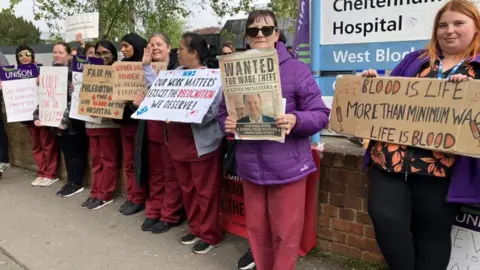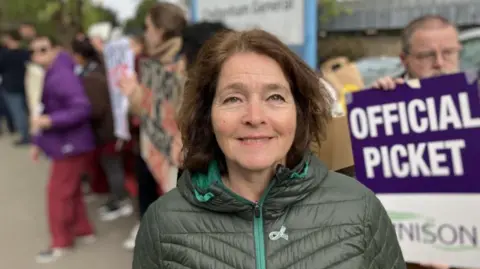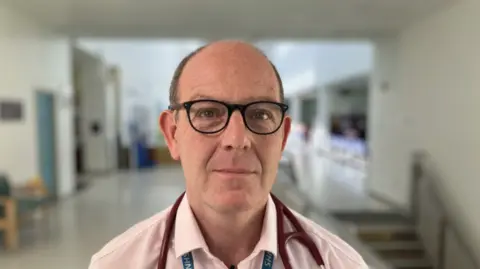'Blood test delays' as workers continue pay protest
 BBC
BBCA dispute over pay means some vulnerable patients are having to come back for repeated blood tests, according to a health union.
About 37 workers who specialise in drawing blood, known as phlebotomists, from Gloucestershire Royal and Cheltenham General hospitals have walked out for a seventh week in a dispute over pay and grading.
Caroline Hayhurst, Cheltenham phlebotomist and Unison member, said healthcare assistants and nurses are not always able to take bloods from complex patients including children and profoundly disabled patients who have difficulties keeping their arms straight.
A hospital spokesperson said it had urged Unison to get round the table for talks.
"It is not accurate to suggest the trust has underpaid our phlebotomists when they are paid in line with the national profile," a spokesperson for Gloucestershire Hospitals NHS Foundation Trust added.
Hospital bosses added that they were not aware of large numbers of patients having to come back for repeated blood tests.
Many other hospitals in the west of England pay their staff slightly more, which is why only Gloucestershire is affected by the strike, union members have said.
The trust denied this and insisted all wages were matched to national job descriptions, which have been developed with unions, and are regularly reviewed.
Hospital chiefs added where other phlebotomists were paid at a higher rate, in hospitals including Southmead, they have other roles outside of taking blood which justifies the higher rate of pay.
But, Christopher Roche, regional organiser of Unison, said staff are on "barely above the minimum wage" and that upgrading them from band A to B would mean an extra 77p an hour, costing the trust between £45,000 to £65,000 a year.
He warned that continued strike action will have an impact on patients as healthcare assistants and nurses will struggle to deal with more complicated cases.
"Staff who are taking the samples are having to make repeated attempts, whereas phlebotomists would be able to do so straight away," he said.
"On the ground, staff say they are really struggling."

Speaking on the picket line, Mrs Hayhurst said: "I have had patients that have come back and have said they have been unable to be bled at the hospital so I have a lot of patients there who do need a phlebotomist, not a nurse, who can take blood.
"We have a lot of current and ex-IV drug-users whose veins are extremely difficult to locate and get a sample from.
"We take from a lot of chemotherapy patients' cultures on the wards which the nurses can't do either."
'Patients are bruised'
Ellie Gould, a fellow Unison member who works two afternoons a week at a GP surgery, told the BBC she is seeing many cases where patients have been bruised because of multiple attempts by non phlebotomists to draw blood.
"Certainly when we first started striking we did come in on a weekend and all of us were shocked about how many bruises were on patients' arms - you could join the dots there were that many.
"It was very, very blatant. Who knows what the samples were like when they got to the lab," she said.
The health trust said it had written to the union on 11 April with a proposal for negotiation and a pause to ongoing industrial action and had yet to receive a formal response.
"Our phlebotomist's job description matches the national profile, which is a Band 2.
"Other local health services also follow the same national job descriptions and pay the same as we do for phlebotomist roles.
"We have encouraged Unison to highlight any changes they believe should be made to the job description for our phlebotomist roles," a spokesperson said.

Prof Mark Pietroni, medical director at the trust, said they have assessed the current wages against the national profile for the role, which is a Band 2.
He said: "Our description is pretty similar, there always points of interpretation, but the evaluation panel agreed that is was a Band 2.
"We would like to sit down with the union and work this through, there are ways we can resolve this strike, it's gone on for too long - it's not good for the staff and it's not good for the patients."
He said the union was asked to explain why the role should be upgraded to a Band 3 and the union has failed to provide the information.
But union bosses disputes this, they claim the information was sent earlier this month.
Follow BBC Gloucestershire on Facebook, X and Instagram. Send your story ideas to us on email or via WhatsApp on 0800 313 4630.
